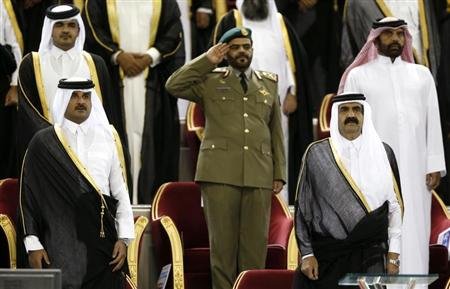 Doha, Jun 25: The Amir of Qatar, His Highness Shaikh Hamad bin Khalifa Al Thani, said on Tuesday he was stepping down and handing power to his son Crown Prince Shaikh Tamim.
Doha, Jun 25: The Amir of Qatar, His Highness Shaikh Hamad bin Khalifa Al Thani, said on Tuesday he was stepping down and handing power to his son Crown Prince Shaikh Tamim.
In a speech broadcast on Qatar state television, Shaikh Hamad said it was time for a new generaiton to take over. He made no direct mention of Prime Minister and Foreign Minister, Shaikh Hamad bin Jassim Al Thani, who had been widely expected to also step down.
“The time has come to open a new page in the jouney of our nation that would have a new generation carry the responsibilities ... with their innovative ideas,” said Shaikh Hamad, reading a prepared text behind his desk.
“I address you today to inform you that I will transfer power to Shaikh Tamim bin Hamad Al Thani. I am fully confident that he is qualified for the responsibility and is trustworthy.”
State television later showed pictures of well wishers greeting the outgoing Amir and Shaikh Tamim at the royal court.
The Amir did not specify when the change would take effect but a Qatari official had said the move, once announced, would take immediate effect.
The Amir made no mention of the fate of veteran politician and the public face of Qatar’s aggresive foreign policy, prime minister Shaikh Hamad bin Jasim Al Khalifa.
Tuesday was a national holiday in the country of a one-family absolute monarchy has ruled over for more than 130 years. The royal court has invited Qataris to go to swear allegiance to Shaikh Tamim on Tuesday and Wednesday.





Comments
Add new comment